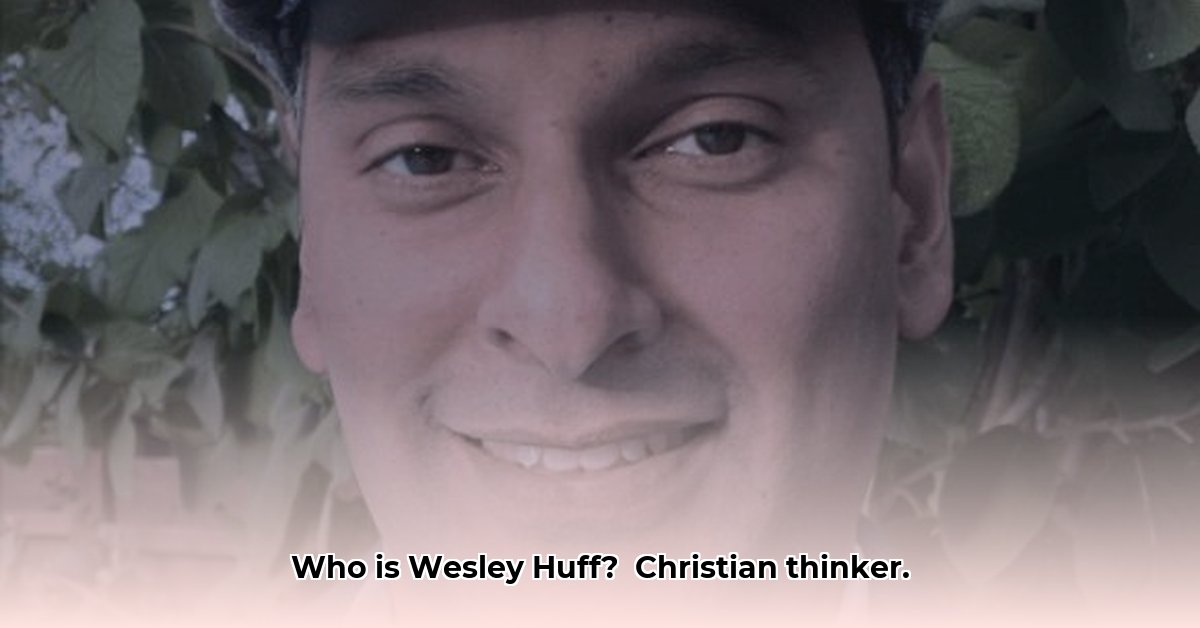Who is Wesley Huff?
Wesley Huff is a Canadian Christian apologist, author, speaker, and teacher. He currently serves as the Central Canada Director for Apologetics Canada and is pursuing a PhD in New Testament at the University of Toronto’s Wycliffe College. His work focuses on defending the Christian faith, particularly through exploring the historical evidence for the resurrection of Jesus Christ and the reliability of the Bible. He gained wider recognition after his appearance on the immensely popular Joe Rogan Experience podcast (JRE #2025), where he engaged in a lively discussion about faith, skepticism, and historical interpretation. Huff’s approach blends academic rigor with an accessible communication style, often incorporating humor and creating infographics to explain complex theological concepts to a broader audience. He’s also affiliated with Power to Change – Students, demonstrating his commitment to engaging with younger generations.
The Making of an Apologist: Huff’s Journey
Huff’s journey to becoming a Christian apologist is intriguing. His childhood, spent in Pakistan and the Middle East, likely exposed him to a diverse tapestry of cultures and beliefs, potentially laying the groundwork for his later interest in interfaith dialogue and understanding different worldviews. A significant health challenge—a period of paralysis and subsequent recovery—may have profoundly shaped his outlook on life and faith. While the specifics remain somewhat veiled, it’s reasonable to assume that these formative experiences played a role in his dedication to exploring and defending Christianity.
Decoding Christian Apologetics
For those unfamiliar with the term, Christian apologetics isn’t about apologizing for one’s faith. Rather, it involves providing reasoned arguments and evidence to support Christian beliefs, often engaging with skeptics and addressing challenging questions. Think of it as building intellectual bridges between faith and reason. Huff, with his academic background and role at Apologetics Canada, acts as a modern-day advocate for Christianity, skillfully presenting the case for its historical and philosophical foundations.
A Deep Dive into the Rogan Conversation
Huff’s appearance on the Joe Rogan Experience thrust him into the spotlight, exposing his work to millions. This conversation, centered around the resurrection of Jesus, wasn’t a dry theological debate. Rogan, known for his inquisitive and sometimes skeptical approach, pressed Huff on the certainty of Jesus’ death, proposing alternative explanations like survival and later reappearance.
Huff countered these suggestions by emphasizing the brutality of Roman crucifixion, arguing that surviving such an ordeal, let alone appearing publicly shortly afterward, would have been highly improbable. Rogan, ever the challenger, brought up a contemporary analogy of someone regaining consciousness before organ donation, prompting a discussion about the applicability of modern medical knowledge to a historical event. This exchange highlighted the complex interplay between faith, historical interpretation, and modern scientific understanding. It’s not about definitively proving or disproving a historical event like the resurrection; rather, it’s about exploring different perspectives and interpretations of the existing evidence. Ongoing research and new discoveries constantly shape how we understand the past, and it’s important to remain open to evolving interpretations.
Beyond Rogan: Exploring Huff’s Work
While the Rogan appearance is arguably his most well-known moment, it’s just one facet of Huff’s broader work. He’s a prolific content creator, although locating his work can sometimes feel like an online treasure hunt. His personal website seems to be in a state of flux, but you can find fragments of his work on platforms like YouTube.
Huff is particularly adept at creating visually engaging infographics that distill complex theological ideas into accessible formats. He possesses a knack for presenting information in a clear and engaging way, making even challenging concepts understandable. He is also a skilled debater, capable of calmly and articulately presenting his arguments.
Huff’s Core Beliefs and Arguments: A Closer Look
Huff’s apologetic work focuses on the historical reliability of the New Testament, particularly the Gospels. He meticulously examines the manuscript evidence, drawing attention to the sheer number of extant copies and their general agreement as indicators of their authenticity. This approach is akin to corroborating eyewitness testimony in a legal setting—multiple accounts that align increase the likelihood of accuracy.
He doesn’t confine his analysis to internal consistency, however. He actively seeks external corroboration from non-Christian sources, further bolstering his case for the trustworthiness of early Christian writings. This cross-referencing strengthens the historical foundation upon which his arguments rest. Within Christian apologetics, many scholars argue that the extensive manuscript evidence for the New Testament makes it the best-attested ancient document, exceeding the available evidence for many classical texts.
Beyond the purely historical, Huff grapples with complex philosophical and theological questions. He addresses the problem of evil—the question of why suffering exists if God is all-good and all-powerful—a conundrum that has perplexed thinkers for centuries. He also explores various world religions and their claims, contrasting them with the tenets of Christianity. This broader perspective allows him to engage with a wider audience and address a broader spectrum of questions about faith and belief.
Where to Find Huff’s Work: A Guide to Resources
While tracking down all of Huff’s work can be challenging given the evolving nature of online platforms, his curated list of recommended books on Christian apologetics remains a valuable resource. This list isn’t simply a collection of titles; it’s carefully categorized by topic, serving as a roadmap for those looking to explore various facets of Christian thought and defense. These categories likely cover a broad range of topics, from introductory texts on apologetics to deeper dives into specific areas like biblical studies, theology, philosophy, and the intersection of faith and science.
Here’s an example of how his recommendations might be structured:
| Category | Recommended Books (Examples) |
|---|---|
| Introduction to Apologetics | Tactics: A Game Plan for Discussing Your Christian Convictions, I Don’t Have Enough Faith to be an Atheist |
| Biblical Studies | The Case for Christ, The Historical Reliability of the Gospels |
| Theology | The Forgotten Trinity, Making Sense of the Trinity |
| Philosophy of Religion | Reasonable Faith, The Kalam Cosmological Argument |
This table offers a glimpse; the full list is much more extensive. It’s important to remember that this list may not reflect Huff’s latest recommendations, and as with any curated list, inclusion doesn’t imply complete agreement with every viewpoint expressed in the recommended books.
Beyond the book list, Huff likely maintains a presence on other platforms. Searching for “Wesley Huff” on YouTube or other video platforms may yield lectures, discussions, or interviews. He may also contribute to blogs or online forums dedicated to Christian apologetics.
The Future of Huff’s Work: What’s Next?
Wesley Huff’s journey as a Christian apologist is ongoing. As he continues his doctoral studies and engages with new research, his perspectives and arguments are likely to evolve and deepen. His ability to connect with a broad audience, combined with his commitment to intellectual rigor, suggests a promising future in the field of Christian apologetics. Whether he’s engaging in nuanced debates, dissecting historical texts, creating accessible infographics, or participating in future podcasts, his contributions will undoubtedly continue to shape discussions about faith and reason in the 21st century.







